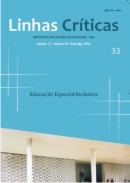The principle of university indissolubility: difficulties and possibilities of articulation
DOI:
https://doi.org/10.26512/lc.v17i33.3818Keywords:
Indissolubility, University, ArticulationAbstract
The goal of the present study is to investigate and analyze the strategies of articulation between teaching, research and continuing education promoted by the faculty of a Brazilian public university. This study is qualitative research, with exploratory and descriptive nature. The results demonstrate that indissolubility can be strengthened by conducting research ruled by disciplinary articulation; integration of academic units, of institutions and of subjects in different formation processes; drawing research themes closer to disciplines developed in the undergraduate program; insertion of the faculty in the Graduate Program; and the development of projects connected to Basic Education, such as PIBID and Novos Talentos (New Talents), among others.
Downloads
References
AZEVEDO, Fernando.As universidades no mundo de amanhã: seu sentido, sua missão e suasperspectivas atuais. São Paulo: Cia. Editora Nacional, 1947.
BRASIL. Constituição (1988). Constituição da República Federativa do Brasil. Brasília, 1988.
______. Plano Nacional de Extensão 1999- 2001. Disponível em: <http://www.mec.gov.br/Sesu/planonaex.shtm>. Acesso em: 12 out. 2010.
______. Congresso Nacional. Lei nº 5.540, de 28 de novembro de 1968. Fixa normas de organização e funcionamento do ensino superior e sua articulação com a escola média. Disponível em: <http://www.jusbrasil.com.br/legislacao/109783/lei-5540-68>. Acesso em: 14 mar. 2010.
______. Decreto nº 11.530, de 18 de Março de 1915. Reorganiza o ensino secundário e o superior na Republica. Disponível em: <http://www2.camara.gov.br>. Acesso em: 14 mar. 2010.
______. Decreto nº 19.851 de 11 de abril de 1931. Estatuto da Universidade Brasileira. Disponível em:<http://www2.camara.gov.br>. Acesso em: 20 mar. 2010.
BOTOMÉ, Sílvio Paulo. Pesquisa alienada e ensino alienante: o equívoco da extensão universitária.Petrópolis: Vozes, 1996.
CHAUÃ, Marilena de Souza.Escritos sobre a universidade.São Paulo: Editora UNESP, 2001.
CHIZZOTTI, Antonio. Metodologia do ensino superior: o ensino como pesquisa. In: CASTANHO, Sérgio;CASTANHO, Maria Eugênia (Org.). Temas e textos em metodologia do ensino superior.Campinas:Papirus, 2001. p.103-112.
CORDEIRO, Jaime. Didática. São Paulo: Contexto, 2007.
CUNHA, Luiz Antonio. Ensino superior e a universidade no Brasil. In: LOPES, Eliane Lopes Teixeira;FARIA FILHO, Luciano Mendes; VEIGA, Cynthia Greive (Org.). 500 anos de educação no Brasil. Belo Horizonte: Autêntica, 2000.
ENRICONE, Délcia.A docência na educação superior:sete olhares. Porto Alegre: Evangraf, 2006.
FREIRE, Paulo. Pedagogia da autonomia:saberes necessários à prática educativa. Rio de Janeiro:Paz e Terra, 1998.
KOURGANOFF, Wladimir. A face oculta da universidade.São Paulo: Editora da Universidade Estadual Paulista, 1990.
MORAES, Roque. Uma tempestade de luz: a compreensão possibilitada pela análise textual discursiva.Ciência & Educação,Bauru, v. 9, n. 2, p. 91-211, 2003.
______; GALIAZZI, Maria do Carmo. Análise Textual Discursiva: processo reconstrutivo de múltiplasfaces. Ciência & Educação,Bauru, v. 12, n. 1, p. 117-128, 2006.
MORIN, Edgar. O desafio do século XXI:religar os conhecimentos. Lisboa: Instituto Piaget, 1999.
MOTA, Ronaldo. O papel da inovação na sociedade e na educação. In: COLOMBO, Sonia Simões [et al.](Org.). Desafios da gestão universitária contemporânea.Porto Alegre: Artmed, 2011.
OLIVEIRA, Claudia Hochheim. Qual é o Papel da Extensão Universitária? Algumas Reflexões Acercada Relação entre Universidade, Políticas Públicas e Sociedade. In: Anais do 2º Congresso Brasileirode Extensão Universitária, 2004, Belo Horizonte. Disponível em: <http://www.ufmg.br/congrext/Gestao/Gestao15.pdf>. Acesso em: 13 abr. 2011.
RAYS, Oswaldo Alonso. Ensino-Pesquisa-Extensão: notas para pensar a indissociabilidade. RevistaCadernos de Educação Especial,n. 21, p. 71-85, 2003.READINGS, Bill. Universidade sem cultura?Rio de Janeiro: EdUERJ, 2002.
SANTOS, Boaventura de Sousa. Pela mão de Alice:o social e o político na pós-modernidade. SãoPaulo: Cortez, 1996.
______. A universidade do século XXI:para uma reforma democrática e emancipatória da universidade.São Paulo: Cortez, 2005.
TEIXEIRA, Anísio. A universidade de ontem e hoje.Rio de Janeiro: EdUERJ, 1998.
TRIVIÑOS, Augusto Nibaldo Silva. Introdução à pesquisa em ciências sociais:a pesquisa qualitativaem educação. São Paulo: Atlas, 1987.
ZABALZA, Miguel A. O ensino universitário:seu cenário e seus protagonistas. Porto Alegre: Artmed,2004.
Downloads
Published
How to Cite
Issue
Section
License
Copyright (c) 2016 Linhas Críticas

This work is licensed under a Creative Commons Attribution 4.0 International License.
Authors who publish in this journal agree to the following terms:
-Authors maintains the copyright and grants the journal the right of first publication, the work being simultaneously licensed under the Creative Commons Attribution License which allows the sharing of the work with recognition of the authorship of the work and initial publication in this journal.
- Authors are authorized to enter into additional contracts separately, for non-exclusive distribution of the version of the work published in this journal (eg publish in institutional repository or as a book chapter), with acknowledgment of authorship and initial publication in this journal.
-Authorers are allowed and encouraged to publish and distribute their work online (eg in institutional repositories or on their personal page) at any point before or during the editorial process, as this can generate productive changes as well as increase the impact and the citation of published work (See The Effect of Free Access).



